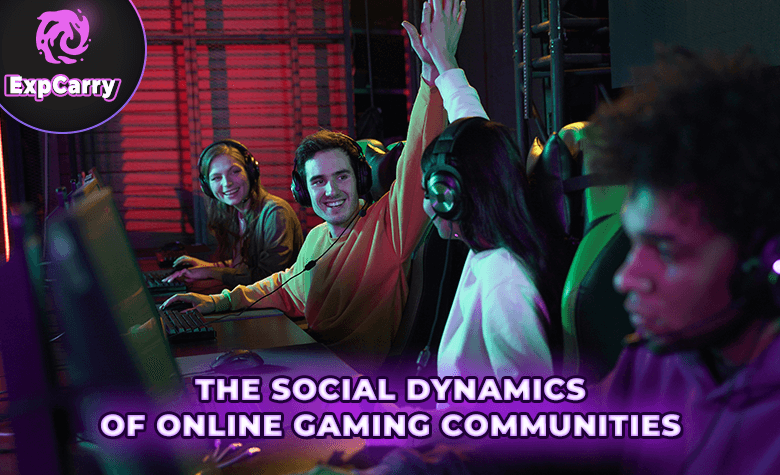The Social Dynamics of Online Gaming Communities

Online gaming communities have evolved into complex social ecosystems, where players not only engage in virtual adventures but also form lasting relationships, develop social skills, and establish unique cultural norms. As we delve into the world of these digital societies, it's essential to understand how they shape and are shaped by the interactions of their members. In this article, we'll explore the intricate social dynamics of online gaming communities, looking at how they function, the roles individuals play, and the impact they have on our broader social fabric.
The Formation of Online Gaming Communities
The Appeal of Virtual Worlds
Why do millions of people flock to online games, creating vast communities? The answer lies in the allure of virtual worlds. These digital landscapes offer an escape from the mundane, a space where imagination reigns supreme. They are realms where individuals can reinvent themselves, free from the constraints of reality. But there's more to it than just escapism. These environments foster a sense of belonging and identity that is often hard to find in the real world.
Interestingly, these online gaming communities can also serve as practical fields for students studying sociology. Engaging in these communities can enrich a student's perspective, enhancing their ability to tackle sociology homework with greater insight. However, when the complexity of sociology homework intensifies, students can always seek specialized assistance. For expert guidance, MySuperGeek's sociology homework help service stands as a reliable resource, offering tailored support to navigate the challenges of academic assignments in sociology.
Building Communities in Digital Spaces
Online gaming isn't just about playing a game; it's about being part of a community. These communities form around shared interests and goals, often transcending geographical and cultural boundaries. From MMORPGs (Massively Multiplayer Online Role-Playing Games) like "World of Warcraft" to battle royale games like "Fortnite," each game has its unique community with its norms and traditions.
The Social Structure of Online Gaming Communities
Roles and Hierarchies
In the world of online gaming, just like in any society, there are roles and hierarchies. You have leaders, strategists, diplomats, and followers. These roles often emerge organically based on players' skills and personalities. For instance, someone with natural leadership qualities might become a guild master in an MMORPG, guiding and organizing other players.
Communication and Collaboration
Communication is the lifeblood of online gaming communities. Through chat rooms, forums, and in-game communication tools, players coordinate strategies, share tips, and forge friendships. This collaboration often extends beyond the game, with communities organizing real-world meetups or supporting each other in personal endeavors.
The Cultural Impact of Online Gaming Communities
Beyond the Game: Social Learning and Development
What happens in these virtual worlds doesn't stay there. The skills and experiences gained in online games can have real-world applications. Players learn teamwork, leadership, problem-solving, and communication skills that are invaluable in everyday life. Moreover, these communities often serve as a platform for cultural exchange, where people from diverse backgrounds share their perspectives and learn from each other.
The Influence on Mainstream Culture
The impact of online gaming communities reaches far beyond their digital borders. These communities have influenced mainstream culture in various ways, from popularizing gaming jargon to inspiring movies and literature. They've even impacted fashion and music, with gaming-inspired styles and soundtracks gaining popularity.
Challenges and Opportunities in Online Gaming Communities
Navigating the Digital Terrain
While these communities offer many benefits, they also pose challenges. Issues like cyberbullying, addiction, and privacy concerns are prevalent. Balancing the immersive experience of online gaming with healthy real-life interactions is crucial for the well-being of players.
The Potential for Positive Change
Online gaming communities have the potential to be forces for positive change. They can foster inclusivity, provide support networks, and serve as platforms for social and political activism. By harnessing the collective power of their members, these communities can impact real-world issues in significant ways.
Conclusion
Online gaming communities are much more than just groups of people playing games together. They are vibrant, dynamic societies that mirror many aspects of the real world. As technology advances and more people connect through these digital platforms, understanding the social dynamics at play becomes increasingly important. These communities offer a unique lens through which we can examine human interaction, cultural exchange, and the formation of social structures. They remind us that even in the virtual realm, our need for connection, belonging, and community prevails.
In conclusion, as we continue to explore and understand these digital societies, we must also recognize their influence and potential. They are not just spaces for entertainment but platforms for learning, growth, and, perhaps most importantly, connection. The social dynamics of online gaming communities are complex and multifaceted, but one thing is clear: they are reshaping the way we think about community, culture, and connection in the digital age.